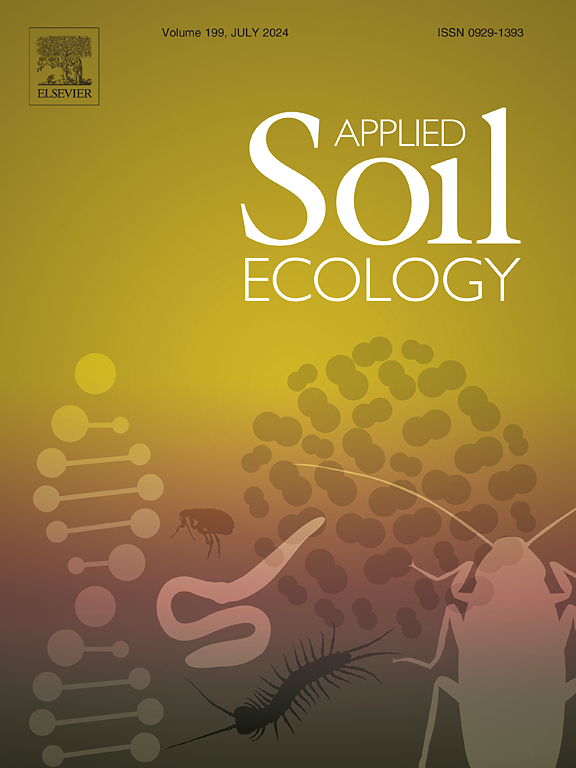芽孢杆菌负载生物炭防治花生枯萎病和改善土壤健康的双重策略
IF 5
2区 农林科学
Q1 SOIL SCIENCE
引用次数: 0
摘要
生物防治剂和生物炭的结合为管理土传疾病提供了一种生态友好的替代方案,减少了对化学杀菌剂的依赖。然而,装载生物炭的生物防治剂如何缓解枯萎病及其与土壤微生物的相互作用尚不清楚。研究了枯草芽孢杆菌BT负载生物炭(BTBC)与生物防治菌株(BT)和生物炭(BC)对花生枯萎病的防治效果及其根际调控机制。结果表明:与对照相比,BTBC显著提高了根际和根系枯草芽孢杆菌的强度(分别提高了2.7倍和65.3倍)。使花生的发病率降低75%,根尖孢镰刀菌丰度降低94.7%,同时增强了对根际微生物群落干扰的抵抗力。BTBC显著提高了土壤有机质和速效钾含量,显著提高了花生荚干重。综上所述,枯草芽孢杆菌负载生物炭的施用不仅促进了枯草芽孢杆菌在环境中的定植,提高了对尖孢霉诱导的枯萎病的防治效果,而且提高了土壤养分和微生物群落的抗扰能力。这些发现为花生枯萎病的管理和控制提供了新的见解。本文章由计算机程序翻译,如有差异,请以英文原文为准。

Bacillus-loaded biochar as a dual strategy for Fusarium wilt control and soil health improvement in Peanut cultivation
The combination of biocontrol agent and biochar presents an eco-friendly alternative for managing soilborne diseases, reducing the dependence on chemical fungicides. However, it remains unclear how biocontrol agent loaded biochar alleviates wilt disease and its interactions with soil microorganisms. This study investigated the effects of Bacillus subtilis BT-loaded biochar (BTBC) compared to the application of the biocontrol strain (BT) and biochar (BC) in controlling peanut wilt disease and its rhizosphere regulation mechanisms. The results showed that BTBC significantly increased the intensity of B.subtilis in the rhizosphere (by 2.7 times) and roots (by 65.3 times) compared to the disease control (FO). It also decreased the disease incidence of peanuts by 75 % and the abundance of Fusarium oxysporum in roots by 94.7 %, simultaneously enhancing the resistance against disturbance of the rhizosphere microbial community. BTBC significantly increased the content of soil organic matter and available potassium, and notably improved the dry weight of peanut pods. In conclusion, the application of B.subtilis loaded biochar not only boosted the colonization of B.subtilis in the environment and its efficacy against F.oxysporum-induced wilt disease, but also improved the soil nutrients and microbial community's resistance to disturbance. These findings provide new insights into managing and controlling the peanut wilt disease.
求助全文
通过发布文献求助,成功后即可免费获取论文全文。
去求助
来源期刊

Applied Soil Ecology
农林科学-土壤科学
CiteScore
9.70
自引率
4.20%
发文量
363
审稿时长
5.3 months
期刊介绍:
Applied Soil Ecology addresses the role of soil organisms and their interactions in relation to: sustainability and productivity, nutrient cycling and other soil processes, the maintenance of soil functions, the impact of human activities on soil ecosystems and bio(techno)logical control of soil-inhabiting pests, diseases and weeds.
 求助内容:
求助内容: 应助结果提醒方式:
应助结果提醒方式:


